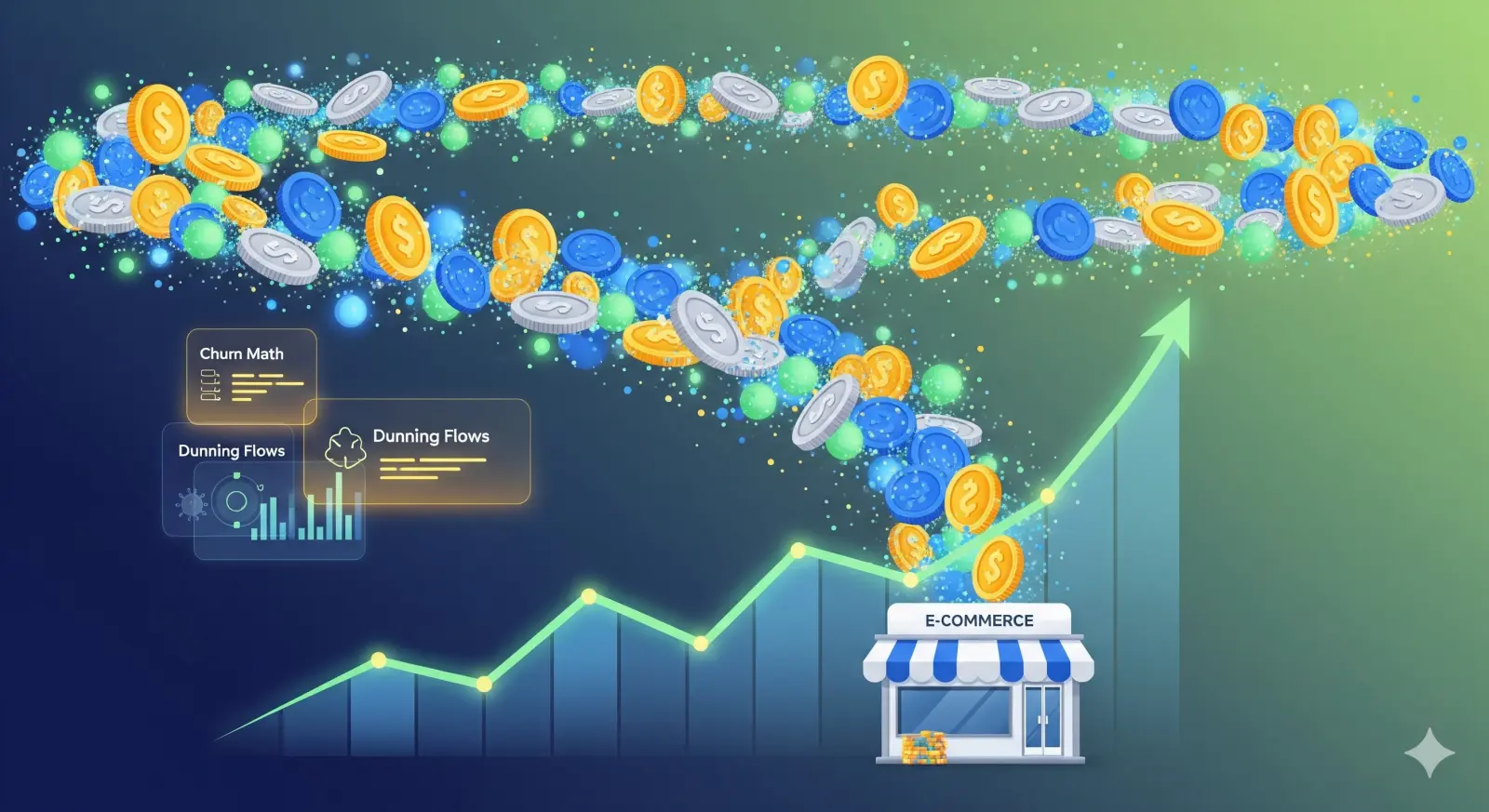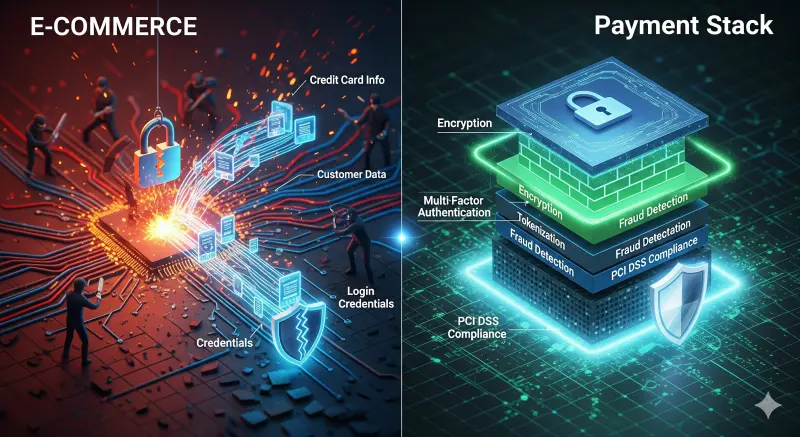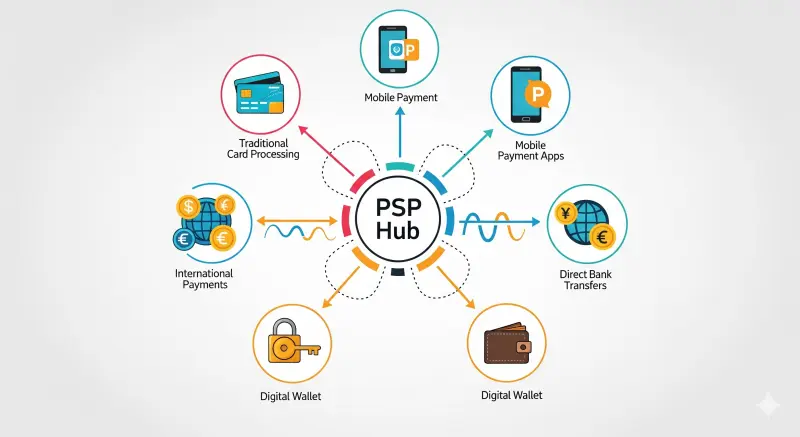Elite Webstores Team
The Rise of Subscription Models: Optimizing Recurring Payments for Long-Term Revenue
15–30% of involuntary churn is preventable with smarter retries, network updates, and segmented dunning—yet many stores treat billing as a black box.
Subscriptions shift the revenue game: focus moves from first order to lifetime expansion. The lever set spans pricing architecture, PSP capabilities, payment method portfolio, and lifecycle messaging.
Subscription Value Stack
| Layer | Purpose | Tools |
|---|---|---|
| Pricing Architecture | Align perceived value + margin | Tiers, usage, hybrid (base + overage) |
| Billing Engine | Automate invoicing + proration | Stripe Billing, Checkout.com recurring, PayPal Subscriptions |
| Payment Reliability | Keep cards valid & retries smart | Network tokenization, intelligent retry ladder |
| Retention Mechanics | Reduce cancel intent & fail churn | Grace periods, pause plans, save offers |
| Expansion Revenue | Grow ARPU | Add-ons, bundles, upgrade nudges |
PSP Capability Snapshot
| PSP | Strength | Gap To Plan For | Quick Win |
|---|---|---|---|
| Stripe | Rich billing primitives (schedules, trials) | Complexity if over-customized | Use smart retries + card updater |
| Checkout.com | Flexible routing for recurring auth | Fewer native upgrade flows | Externalize upgrade logic via API |
| PayPal | Trusted for consumer subs | Limited granular usage billing | Offer PayPal + card for choice |
| Worldpay | Enterprise scale + tokenization | Slower config cycles | Leverage Account Updater early |
Launch Blueprint (0–90 Days)
- Define pricing hypotheses (Good/Better/Best + usage anchor).
- Map PSP feature coverage; fill gaps (proration, metering, webhooks).
- Implement tokenization + network updater (reduce upfront churn risk).
- Establish retry ladder (timing + method shift + channel notifications).
- Instrument subscription lifecycle analytics (MRR, logo churn, NDR, involuntary churn %).
- Deploy dunning templates (tone tiers: friendly → urgency) with dynamic payment link.
Churn Mechanics Breakdown
| Churn Type | Driver | Mitigation |
|---|---|---|
| Voluntary | Value mismatch, price sensitivity | Exit survey → pause/discount path |
| Involuntary | Payment failure, expired card | Token updater + adaptive retries |
| Feature | Competitor differentiation | Roadmap alignment + upgrade prompts |
| Product Fit | Early lifecycle confusion | Onboarding checklist + activation nudges |
Intelligent Retry Ladder Example
Narrative format (avoid table fatigue): Attempt #1 immediate; #2 after 6 hours (same method); #3 after 24 hours (different descriptor if possible); #4 after card updater cycle; #5 after 3 days with customer notice; final attempt day 7 plus downgrade/hold.
Metrics That Matter
| Metric | Definition | Target Range |
|---|---|---|
| Gross Logo Churn % | Lost subs / starting logos | <4–6% monthly (SMB) |
| Involuntary Churn % | Failed billing losses / total churn | <25% of churn |
| Net Dollar Retention | (Starting MRR + Expansion - Contraction - Churn)/Starting | >115% (aspirational) |
| Recovery Rate | Recovered failed invoices / failed invoices | >50% with mature ladder |
| Trial Conversion | Trial→paid count / trial starts | 40–60% (aligned w/ intent) |
SCA & Compliance Notes
- Leverage MIT (Merchant Initiated Transactions) flags post initial 3DS auth.
- Use mandate references for recurring SEPA / Direct Debit flows.
- Maintain audit log of consent, plan changes, price uplifts (reg + trust).
- Graceful handling of subscription price increase: 30-day notice + click confirm.
Upsell & Expansion Tactics
- Time-to-value milestone triggers (feature X used → prompt upgrade).
- Usage threshold alerts with pre-upgrade CTA.
- Bundled add-ons (security, priority support) at anniversary.
- Annual prepay incentive (1–2 free months equivalent) to lock retention.
Tooling Ecosystem (Optional Adds)
List form: Billing analytics (ProfitWell / ChartMogul alternative internal), Messaging (customer.io), Revenue recognition engine, Churn prediction model.
ROI Narrative
Story: By reducing involuntary churn from 3.8% → 2.2% and lifting NDR from 108% → 116% through upgrade path redesign + retry optimization, blended LTV increased 19% in 2 quarters.
Checklist
- Retry ladder configured
- Token + updater enabled
- Dunning templates A/B ready
- Subscription lifecycle dashboard live
- Upgrade / downgrade paths mapped
- Consent + mandate logs stored
Where Elite Webstores Helps
We design recurring revenue stacks: pricing experiments, PSP billing integration, retention mechanics, and analytics instrumentation.
Need to rescue churned revenue? Contact us or explore Services.
Sustainable recurring revenue starts with resilient billing operations. Let’s optimize yours →



